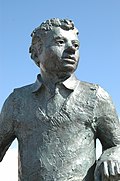Welcome to the Poetry Portal


Poetry (from the Greek word poiesis, "making") is a form of literary art that uses aesthetic and often rhythmic qualities of language to evoke meanings in addition to, or in place of, literal or surface-level meanings. Any particular instance of poetry is called a poem and is written by a poet. Poets use a variety of techniques called poetic devices, such as assonance, alliteration, euphony and cacophony, onomatopoeia, rhythm (via metre), and sound symbolism, to produce musical or incantatory effects. Most poems are formatted in verse: a series or stack of lines on a page, which follow a rhythmic or other deliberate pattern. For this reason, verse has also become a synonym (a metonym) for poetry.
Poetry has a long and varied history, evolving differentially across the globe. It dates back at least to prehistoric times with hunting poetry in Africa and to panegyric and elegiac court poetry of the empires of the Nile, Niger, and Volta River valleys. Some of the earliest written poetry in Africa occurs among the Pyramid Texts written during the 25th century BCE. The earliest surviving Western Asian epic poem, the Epic of Gilgamesh, was written in the Sumerian language.
Early poems in the Eurasian continent evolved from folk songs such as the Chinese Shijing as well as from religious hymns (the Sanskrit Rigveda, the Zoroastrian Gathas, the Hurrian songs, and the Hebrew Psalms); or from a need to retell oral epics, as with the Egyptian Story of Sinuhe, Indian epic poetry, and the Homeric epics, the Iliad and the Odyssey. (Full article...)
Selected article

Although meeting the criteria for an epic, the poem defies simple genre classification by its use of varying themes and tones. Ovid took inspiration from the genre of metamorphosis poetry, and some of the Metamorphoses derives from earlier treatment of the same myths; however, he diverged significantly from all of his models.
One of the most influential works in Western culture, the Metamorphoses has inspired such authors as Chaucer, Shakespeare, Dante and Boccaccio. Numerous episodes from the poem have been depicted in masterpieces of sculpture and painting by artists such as Titian. Although interest in Ovid faded after the Renaissance, towards the end of the twentieth century there was a resurgence of attention to his work; today, the Metamorphoses continues to inspire and be retold through various media. The work has been the subject of numerous translations into English, the first by William Caxton in 1480. (Full article...)
Selected image
Poetry WikiProject

Selected biography

Although Thomas was appreciated as a popular poet in his lifetime, he found earning a living as a writer difficult, which resulted in his augmenting his income with reading tours and broadcasts. His radio recordings for the BBC during the latter half of the 1940s brought him to the public's attention and he was used by the Corporation as a populist voice of the literary scene. In the 1950s, Thomas travelled to America, where his readings brought him a level of fame, though his erratic behaviour and drinking worsened. His time in America cemented Thomas' legend, where he recorded to vinyl works such as A Child's Christmas in Wales. (Full article...)
Did you know (auto-generated) -

- ... that Iris Murdoch wrote a poem juxtaposing the outbreak of World War II with a seminar by Eduard Fraenkel?
- ... that the 1887 execution of George Flaxman may have inspired Rudyard Kipling's poem "Danny Deever"?
- ... that the poem "Ovid in the Third Reich" has been described as "a classic reaction" to the Eichmann trial, despite being published before the trial was held?
- ... that the poet Fernando Pessoa considered Alberto Caeiro, one of his own heteronyms, to be his master?
- ... that Siegfried Goldschmidt translated Kalidasa's epic poem Sêtubandhu from Prakrit into German?
- ... that Ashiq Peri was the first prominent female folk poet in Azerbaijan?
Selected poem
| Clair de lune by Paul Verlaine |
|---|
|
Your soul is a lovely garden, and go |
Related portals
Topics
Recognized content
Categories
Associated Wikimedia
The following Wikimedia Foundation sister projects provide more on this subject:
-
 Commons
Commons
Free media repository -
 Wikibooks
Wikibooks
Free textbooks and manuals -
 Wikidata
Wikidata
Free knowledge base -
 Wikinews
Wikinews
Free-content news -
 Wikiquote
Wikiquote
Collection of quotations -
 Wikisource
Wikisource
Free-content library -
 Wikiversity
Wikiversity
Free learning tools -
 Wiktionary
Wiktionary
Dictionary and thesaurus
















Recent Comments